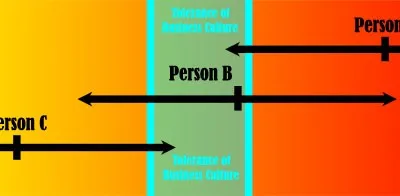Leadership Insights From Apple’s Jobs To Cook Transition
Posted on24 Aug 2020
TagsApple (company), Wall Street Journal, Tim Cook, Jeff Immelt, Steve Jobs, adaptability, conditionality, Jack Welch, leadership
Comments0
When Steve Jobs died, markets worried that Apple’s best days were behind it. Yet, the transition to Tim Cook proved this wrong.... Read More
Making Good Leadership Decisions Has Two Keys
Making good leadership decisions is easy to know. Doing it is another matter. A Harvard Business Review article talked about four behaviors... Read More
How Different People React to Structure in the Workplace
Posted on06 Apr 2015
Tagsadaptability, diversity, micromanagement, money, organization, people's differences, Talent, homogeneity, structure, bell curve
Comments2
Businesses need structure to grow. Organization, processes, policies and procedures are just some of what this is. How different people react to... Read More
Wood Splitting Teaches Us About Knotty People
Thinking at the intersection of ideas is very helpful in solving problems. The book, The Medici Effect by Frans Johansson, says this... Read More
Apocalyptic Decision Making – Dealing with Uncertainty
When four horsemen of apocalyptic decision making (Volatility, Uncertainty, Complexity and Ambiguity [VUCA]) confront us, we tend to avoid them. We avoid... Read More
Human Lessons from a Bourbon Tornado
A tornado demolished a Buffalo Trace Distillery’s warehouse miraculously leaving all barrels of aging bourbon undamaged but exposed to the elements for... Read More
Change Management Strategy #4: Change Jobs, Reduce Tenure
Posted on11 Apr 2013
Tagsadaptability, change management, coaching, decisions, executive, experience, Harvard Business Review, incentives, Job, knowledge, management, perspective, resistance to change, risk, strategy, Change Management Strategy Series, Xueming Luo, Vamsi Kanuri, Michelle Andrews, tenure
Comments0
As we acquire knowledge and experience, we tend to become wedded to the status quo. Tenure compounds this effect as Xueming Luo,... Read More
Reducing Dependency on Talent through Rules
Posted on01 Apr 2013
Tagsadaptability, computers, organizational culture, employees, flexibility, instructions, logic, process, process management, rules, Talent, The Atlantic, Adam Davidson
Comments0
Rules are a form of logic especially when used in a series to form instructions. A step builds on the former step... Read More
Stories as Inhibitors of Change, Innovation
Posted on11 Mar 2013
Tagsopinions, change, change management, dissent, facts, history, ideas, Influence, innovation, Northwestern University, adaptability, question, rationale, storytelling, The New Yorker, thinking process, think outside the box, George Packer, Dan McAdams
Comments0
Stories galvanize people, helping them to learn, to coalesce around ideas. If we look at this galvanization as solidification, we can also... Read More
Extremely Unified Groups: More Aggressive, More Destructive
Posted on20 Aug 2012
Tagsplanning, organizational culture, Daisy Yuhas, Disruptive Innovation & People Analogy, dissent, group, innovation, leadership, military, people, creativity, product of our environment, Scientific American, Scott Wiltermuth, standardization, Stanford Prison Experiment, synchronicity, team building, University of Southern California, USC Marshall School of Business, adaptability, aggressive, business planning, compliance
Comments0
Groups change people; a person in a group is very different alone. Subliminal influences encourage groups to accept those who adopt its... Read More






